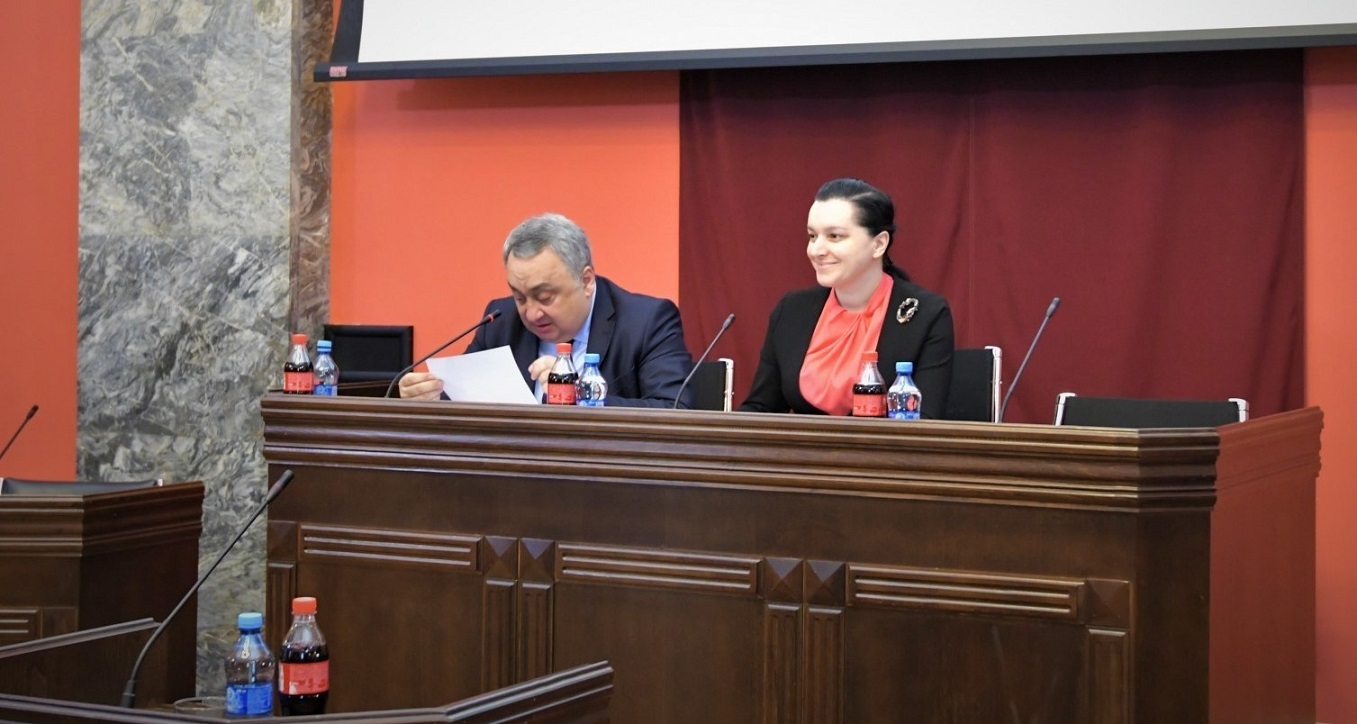Georgian MP: Georgians in Azerbaijan must have the same rights as Azerbaijanis in Georgia

The chairwoman of the Parliamentary Committee on Education and Culture, Mariam Jashi, has said that ethnic Georgians living in Azerbaijan should have the same rights as ethnic Azerbaijanis living in Georgia.
Jashi made the statement after a joint meeting of parliamentary committees on issues of the diaspora, education and culture.
A joint meeting of these two committees was held yesterday in parliament, and was devoted to the problems of the Georgian diaspora in the historic Saingilo region of Azerbaijan. The Georgian ombudswoman said that the statement was relaying “the wrong message”, with some human rights groups even calling it discriminatory.
_________________
“The rights of Georgians living in Azerbaijan should be the same as the rights of Azerbaijanis living in Georgia, both in education and in other fields,” Mariam Jashi said while summing up the joint meeting of the two committees.
Of particular concern at the meeting were Georgian schools in Azerbaijan, the possibility of studying the Georgian language, the restoration of the Georgian House of Culture in the Qakh region, and the issue of “preserving the identity of the Georgian population”.
MPs expressed their belief that all these issues can be resolved in the format of bilateral cooperation.
Jashi did not deny that the Azerbaijani community in Georgia has similar problems, but also noted that the same problems are experienced by citizens of the country who live in highland areas.
“There are a number of factors that are problematic, both for the ethnic minorities of Georgia and for Georgians living in the highlands,” Jashi said.
• Vacuum
• Landmines on the Georgian-Azerbaijani border
• Azerbaijanis demonstrate near Tbilisi parliament in protest of bust of Armenian combatant
Jashi says that in the field of education, as well as a number of other fields, it is necessary to balance the rights of Georgians living in Azerbaijan with the rights of Azerbaijanis living in Georgia.
“It is necessary to develop a unified approach based on cooperation,” Jashi said.
Zviad Kvachantiradze, Chairman of the Committee on Diaspora and Caucasus Issues, stressed that Azerbaijan is a strategic partner of Georgia, and asked: “What will be the basis for a step-by-step solution of the problems of the Georgian population in Azerbaijan?”
Kvachantiradze says that a meeting is planned for Georgian MPs to meet with representatives of the Georgian diaspora in Azerbaijan.
Public resonance
Human rights activists have already responded to Jashi’s statement, saying it is a mistake to tie the problems of the Azerbaijani community of Georgia to the problems of the Georgian diaspora in Azerbaijan.
Georgian ombudswoman Nino Lomjaria published a post on Facebook in which she pointed out the inadmissibility of dividing Georgian citizens along ethnic lines.
“Ethnic Azerbaijanis living in Georgia are the same citizens of Georgia as Georgians, and enjoy the same rights as ethnic Georgians and other nationalities,” Nino Lomjaria wrote.
She argues that the protection of the rights of Georgian citizens, including the rights of ethnic minorities, is the direct responsibility of the Georgian state, and this should not be done in order to “demonstrate to Azerbaijan or another state, to get counter-benefits or even to achieve certain justified goals”.
The head of the Sapari organization, human rights advocate Baia Pataraia, spoke more radically, calling Jashi’s statement “anti-state” and “discriminatory”.
“How dare you divide the citizens of Georgia along ethnic lines and equate them with the Georgian diaspora abroad? What kind of approach is this?” Pataraia wrote on Facebook.
She lists a number of problems faced by the Azerbaijani community of Georgia and says the Georgian state has nothing to be proud of in addressing them:
“What has been done for Georgian Azeris? For so many years, even the Georgian language was not properly taught, not a single normal programme was offered either to children or adults … You are segregating the people and are mixed up with Aliyev’s people in God-knows-what. It’s not Aliyev who has to worry about people who have lived in Georgia for centuries, and who have one homeland – Georgia!” writes Pataraia.
_______________
•The Azerbaijani community in Georgia is the largest ethnic minority in the country. Around 223,000 Azerbaijanis live in Georgia, which is more than six per cent of the total population of the country (according to the 2014 census). Most of the country’s Azerbaijanis live in Georgia’s eastern region of Kvemo Kartli.
Kvemo Kartli is economically one of the most powerful regions of Georgia. The local population is engaged in agriculture, growing vegetables and fruits, and cattle herding.
One of the main problems of the region remains poor knowledge of the state language by local residents. Most of the population do not speak Georgian, which complicates their integration and employment in various institutions of the country.
• Saingilo is the name of the historical region of feudal Georgia, which is today part of Azerbaijan. Geographically it borders on the north-east of the Georgian region of Kakheti.
Saingilo includes Beylagan, Zakatala and Qakh districts. Many Georgians that live in these regions have converted to Islam.
According to 2014 data, 14,877 ethnic Georgians live in Azerbaijan. Most of them are in the north-west of Azerbaijan in Saingilo. In Qakh there are 7,450, in Beylagan 1,731, and in Zagatala, 3,071.
There are six Georgian schools and six Georgian sectors in Azerbaijani schools. All of them are in Saingilo. Most Georgians living in Saingilo have retained knowledge of the Georgian language.


















